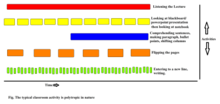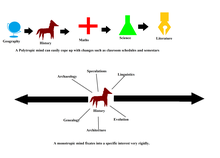Monotropism
This article needs to be updated. The reason given is: This article does not include research past the early 2010s except through one indirect reference.. (October 2023) |

Monotropism is a person's tendency to focus their
A tendency to focus attention tightly has a number of psychological implications. While monotropism tends to cause people to miss things outside their attention tunnel, within it, their focused attention can lend itself to intense experiences, deep thinking and flow states.[2]
However, this
Characteristics



Since the amount of attention available to a person is limited,
Monotropic individuals have trouble processing multiple things at once, particularly when it comes to multitasking while listening. For example, some students have trouble taking notes in class while listening to a teacher[3] and may find it difficult to read a person's face and comprehend what they are saying simultaneously.[1] A common tendency is for individuals to avoid complex sensory environments because of this hypersensitivity.[3] Monotropic individuals may suppress attention and focus on something else, or develop great depth in a given interest or skill.[4]
Implications for practice
Murray et al. (2005) proposed certain steps to help autistic individuals, such as increasing "connections", building understanding through the child's interests, and making connections between people and concepts more "meaningful and less complex."[1]
See also
- Autism and memory
- Caetextia
- Monomania
- Idée fixe
- Introversion
- Centration
- Obsessive–compulsive personality disorder
References
- ^ S2CID 6476917.
- ISBN 9781905218356.
- ^ ISBN 9781843101666.
- ISBN 9781912755394.
Further reading
- Lawson, Wenn (2011). The Passionate Mind: How People with Autism Learn. London: ISBN 978-1-84905-121-7.
- ISBN 978-3-319-91279-0.
- Murray, Fergus (30 November 2018). "Me and Monotropism: A unified theory of autism". The British Psychological Society.
External links
- monotropism.org Information portal on monotropism, including an archive of Dinah Murray's work on the subject
